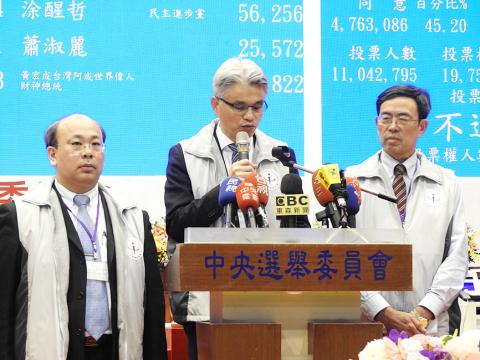Former Central Election Commission (CEC) chairman Chen In-chin (陳英鈐) yesterday apologized to voters and resigned over criticisms surrounding long delays at polling booths for the nine-in-one elections on Saturday.
“As the senior official, I must accept all responsibility and as I have said before, I will engage in sincere introspection,” Chen said before announcing his resignation.
Executive Yuan spokeswoman Kolas Yotaka confirmed that Chen’s resignation has been accepted.

Photo: Chen Yu-fu, Taipei Times
With people still lined up as polling stations were scheduled to close, the commission allowed voting to continue, with some stations remaining open while others were counting ballots.
Polling stations become ballot-counting stations immediately upon the completion of voting, according to Article 57 of the Civil Servants Election and Recall Act (公職人員選舉罷免法).
Chen consulted 15,000 polling stations nationwide before Saturday to ask about the possibility of adding more screens to accommodate more voters, but only 3,500 of the stations were large enough for additional screens, he said.
Polling station locations were already determined when additional referendums were added and it was too late to change them, he said.
The commission asked people to be sure that they understood the referendums before entering voting booths to speed things up, he said.
“It really was too long to make people wait, but overall, the process remained quite orderly,” he said.
Chen rejected reports that ballots were being counted at polling stations that were still open.
However, those who were in line before 4pm were permitted to vote, which was in accordance with the law, he said.
Asked why the commission did not wait until all polling stations closed before starting to count ballots, Chen said the law stipulates that the changeover must be done at each station immediately following the completion of voting.
There have also been incidents in previous elections of polling stations starting their counts at different times, he said, adding that he welcomed input on whether voting would be affected by this.
Taipei’s 1,563 polling stations had all finished with voting by 7:46pm — just after Taoyuan, which finished at 7:29pm.
Taipei’s Nangang District (南港) polling station finished counting votes at about 11pm — the first of the city’s 1,563 stations to do so — and by 2:35am yesterday all stations in Taipei were finished, 10 hours, 35 minutes from when polls opened.
The last polling station nationwide to finish counting was Dayun Bisian Temple (大雲碧仙寺) in Taoyuan’s Jhongli District (中壢), which finished at 2:39am.
“This is the first time the process has taken this long,” said a polling station worker in Taipei, who spoke on condition of anonymity.
Lin Mei-lun (林美倫), director of a Taipei elections supervisory task force, said she would raise concerns with the commission over the poor execution of this year’s elections.
The referendums must be separated from the mayoral and commissioner elections, or an electronic system adopted for referendum voting, Lin said.

US President Donald Trump yesterday announced sweeping "reciprocal tariffs" on US trading partners, including a 32 percent tax on goods from Taiwan that is set to take effect on Wednesday. At a Rose Garden event, Trump declared a 10 percent baseline tax on imports from all countries, with the White House saying it would take effect on Saturday. Countries with larger trade surpluses with the US would face higher duties beginning on Wednesday, including Taiwan (32 percent), China (34 percent), Japan (24 percent), South Korea (25 percent), Vietnam (46 percent) and Thailand (36 percent). Canada and Mexico, the two largest US trading

AIR SUPPORT: The Ministry of National Defense thanked the US for the delivery, adding that it was an indicator of the White House’s commitment to the Taiwan Relations Act Deputy Minister of National Defense Po Horng-huei (柏鴻輝) and Representative to the US Alexander Yui on Friday attended a delivery ceremony for the first of Taiwan’s long-awaited 66 F-16C/D Block 70 jets at a Lockheed Martin Corp factory in Greenville, South Carolina. “We are so proud to be the global home of the F-16 and to support Taiwan’s air defense capabilities,” US Representative William Timmons wrote on X, alongside a photograph of Taiwanese and US officials at the event. The F-16C/D Block 70 jets Taiwan ordered have the same capabilities as aircraft that had been upgraded to F-16Vs. The batch of Lockheed Martin

GRIDLOCK: The National Fire Agency’s Special Search and Rescue team is on standby to travel to the countries to help out with the rescue effort A powerful earthquake rocked Myanmar and neighboring Thailand yesterday, killing at least three people in Bangkok and burying dozens when a high-rise building under construction collapsed. Footage shared on social media from Myanmar’s second-largest city showed widespread destruction, raising fears that many were trapped under the rubble or killed. The magnitude 7.7 earthquake, with an epicenter near Mandalay in Myanmar, struck at midday and was followed by a strong magnitude 6.4 aftershock. The extent of death, injury and destruction — especially in Myanmar, which is embroiled in a civil war and where information is tightly controlled at the best of times —

China's military today said it began joint army, navy and rocket force exercises around Taiwan to "serve as a stern warning and powerful deterrent against Taiwanese independence," calling President William Lai (賴清德) a "parasite." The exercises come after Lai called Beijing a "foreign hostile force" last month. More than 10 Chinese military ships approached close to Taiwan's 24 nautical mile (44.4km) contiguous zone this morning and Taiwan sent its own warships to respond, two senior Taiwanese officials said. Taiwan has not yet detected any live fire by the Chinese military so far, one of the officials said. The drills took place after US Secretary